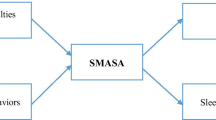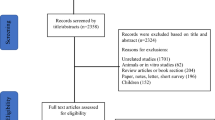Abstract
Background
This study was conducted to determine what symptom components or conditions of insomnia are related to subjective feelings of insomnia, low health-related quality of life (HRQOL), or depression.
Method
Data from 7,027 Japanese adults obtained using an Internet-based questionnaire survey was analyzed to examine associations between demographic variables and each sleep difficulty symptom item on the Pittsburgh Sleep Quality Index (PSQI) with the presence/absence of subjective insomnia and scores on the Short Form-8 (SF-8) and Center for Epidemiologic Studies Depression Scale (CES-D).
Results
Prevalence of subjective insomnia was 12.2 % (n = 860). Discriminant function analysis revealed that item scores for sleep quality, sleep latency, and sleep medication use on the PSQI and CES-D showed relatively high discriminant function coefficients for identifying positivity for the subjective feeling of insomnia. Among respondents with subjective insomnia, a low SF-8 physical component summary score was associated with higher age, depressive state, and PSQI items for sleep difficulty and daytime dysfunction, whereas a low SF-8 mental component summary score was associated with depressive state, PSQI sleep latency, sleeping medication use, and daytime dysfunction. Depressive state was significantly associated with sleep latency, sleeping medication use, and daytime dysfunction.
Conclusion
Among insomnia symptom components, disturbed sleep quality and sleep onset insomnia may be specifically associated with subjective feelings of the disorder. The existence of a depressive state could be significantly associated with not only subjective insomnia but also mental and physical QOL. Our results also suggest that different components of sleep difficulty, as measured by the PSQI, might be associated with mental and physical QOL and depressive status.
Similar content being viewed by others
References
Moul DE, Nofzinger EA, Pilkonis PA, Houck PR, Miewald JM, Buysse DJ. Symptom reports in severe chronic insomnia. Sleep. 2002;25:553–63.
Varkevisser M, Van Dongen HP, Van Amsterdam JG, Kerkhof GA. Chronic insomnia and daytime functioning: an ambulatory assessment. Behav Sleep Med. 2007;5:279–96.
Ustinov Y, Lichstein KL, Wal GS, Taylor DJ, Riedel BW, Bush AJ. Association between report of insomnia and daytime functioning. Sleep Med. 2010;11:65–8.
Fortier-Brochu E, Beaulieu-Bonneau S, Ivers H, Morin CM. Insomnia and daytime cognitive performance: a meta-analysis. Sleep Med Rev. 2012;16:83–94.
Sasai T, Inoue Y, Komada Y, Nomura T, Matsuura M, Matsushima E. Effects of insomnia and sleep medication on health-related quality of life. Sleep Med. 2010;11:452–7.
Okajima I, Komada Y, Nomura T, Nakashima K, Inoue Y. Insomnia as a risk for depression: a longitudinal epidemiologic study on a Japanese rural cohort. J Clin Psychiatry. 2012;73:377–83.
AASM AAoSM. International classification of sleep disorders, 2nd ed.: Diagnostic and coding manual. 2005.
Buysse DJ, Ancoli-Israel S, Edinger JD, Lichstein KL, Morin CM. Recommendations for a standard research assessment of insomnia. Sleep. 2006;29:1155–73.
Cho HJ, Lavretsky H, Olmstead R, Levin MJ, Oxman MN, Irwin MR. Sleep disturbance and depression recurrence in community-dwelling older adults: a prospective study. Am J Psychiatry. 2008;165:1543–50.
LeBlanc M, Merette C, Savard J, Ivers H, Baillargeon L, Morin CM. Incidence and risk factors of insomnia in a population-based sample. Sleep. 2009;32:1027–37.
De Zambotti M, Covassin N, De Min Tona G, Sarlo M, Stegagno L. Sleep onset and cardiovascular activity in primary insomnia. J Sleep Res. 2011;20:318–25.
Aritake-Okada S, Nakao T, Komada Y, Asaoka S, Sakuta K, Esaki S, et al. Prevalence and clinical characteristics of restless legs syndrome in chronic kidney disease patients. Sleep Med. 2011;12:1031–3.
Okawa M. Sleep medicine in Asia at present and prospects. J Natl Inst Public Health. 2012;61:29–34.
SLEep epidemiological survey. 2002.
Komada Y, Nomura T, Kusumi M, Nakashima K, Okajima I, Sasai T, et al. Correlations among insomnia symptoms, sleep medication use and depressive symptoms. Psychiatry Clin Neurosci. 2011;65:20–9.
Nomura TIY, Kusumi M, Oka Y, Nakashima K. Email-based epidemiological surveys on restless legs syndrome in Japan. Sleep Biol Rhythm. 2008;6:139–45.
Enomoto M, Li L, Aritake S, Nagase Y, Kaji T, Tagaya H, et al. Restless legs syndrome and its correlation with other sleep problems in the general adult population of Japan. Sleep Biol Rhythm. 2006;4:153–9.
Doi Y, Minowa M, Uchiyama M, Okawa M, Kim K, Shibui K, et al. Psychometric assessment of subjective sleep quality using the Japanese version of the Pittsburgh Sleep Quality Index (PSQI-J) in psychiatric disordered and control subjects. Psychiatry Res. 2000;97:165–72.
Ware JE KM, Dewey JE, Gandek B. How to score and interpret single-item health status measures: a manual for users of the SF-8 Health Survey. 2001.
Fukuhara S, Ware JE, Kosinski M, Wada S. B G. Psychometric and clinical tests of validity of the Japanese SF-36 Health Survey. J Clin. Epidemiology. 1998;51:1045–53.
Fukuhara S, Bito S, Green J, Hsiao A, Kurokawa K. Translation, adaptation, and validation of the SF-36 Health Survey for use in Japan. J Clin. Epidemiology. 1998;51:1037–44.
Fukuhara S, Suzukamo Y. Japanese version of SF-8: health related QOL: SF-36 and SF-8. J Clin Exp Med. 2005;213:133–6.
Radloff LS. The CES-D scale: a self-report depression scale for research in the general population. Appl Psychol Meas. 1977;1:385–401.
Yokoyama E, Kaneita Y, Saito Y, Uchiyama M, Matsuzaki Y, Tamaki T, et al. Association between depression and insomnia subtypes: a longitudinal study on the elderly in Japan. Sleep. 2010;33:1693–702.
Poulin C, Hand D, Boudreau B. Validity of a 12-item version of the CES-D used in the National Longitudinal Study of Children and Youth. Chronic Dis Can. 2005;26:65–72.
Carroll A, Gordon K, Haynes M, Houghton S. Goal setting and self-efficacy among delinquent, at-risk and not at-risk adolescents. J Youth Adolesc. 2013;42:431–43.
Spitzer RL, Kroenke K, Linzer M, Hahn SR, Williams JB, deGruy 3rd FV, et al. Health-related quality of life in primary care patients with mental disorders. Results from the PRIME-MD 1000 Study. JAMA J Am Med Assoc. 1995;274:1511–7.
Alonso J, Angermeyer MC, Bernert S, Bruffaerts R, Brugha TS, Bryson H, et al. Disability and quality of life impact of mental disorders in Europe: results from the European Study of the Epidemiology of Mental Disorders (ESEMeD) project. Acta Psychiatr Scand Suppl. 2004;109:38–46.
Fortner BV, Stepanski EJ, Wang SC, Kasprowicz S, Durrence HH. Sleep and quality of life in breast cancer patients. J Pain Symptom Manag. 2002;24:471–80.
Edinger JD, Fins AI, Glenn DM, Sullivan Jr RJ, Bastian LA, Marsh GR, et al. Insomnia and the eye of the beholder: are there clinical markers of objective sleep disturbances among adults with and without insomnia complaints? J Consult Clin Psychol. 2000;68:586–93.
Morphy H, Dunn KM, Lewis M, Boardman HF, Croft PR. Epidemiology of insomnia: a longitudinal study in a UK population. Sleep. 2007;30:274–80.
Acknowledgments
This study was supported in part by a Grant-in-Aid for Scientific Research from the Ministry of Education, Culture, Sports, Science and Technology of Japan. This study (work) was supported by the Health and Labour Sciences Research Grants for Comprehensive Research on Disability Health and Welfare.
Disclosure Statement
Yuichi Inoue has received a speaker honorarium from Hisamitsu Pharmaceutical Co., Inc.; Nippon Boehringer Ingelheim Co., Ltd.; Philips Respironics GK; Alfresa Pharma Corporation; Takeda Pharmaceutical Company Limited; MSD K.K.; Pacific Medico Co., Ltd.; Otsuka Pharmaceutical Co., Ltd.; Eisai Co., Ltd.; Mitsubishi Tanabe Pharma Corporation; GlaxoSmithKline K.K.; Astellas Pharma Inc.; Sanofi-Aventis K.K.; and Yoshitomiyakuhin Corporation. Sayaka Aritake, Shoichi Asaoka, Tatsuo Kagimura, Akiyoshi Shimura, Kunihiro Futenma, and Yoko Komada declare that they have no conflict of interest.
Author information
Authors and Affiliations
Corresponding author
Rights and permissions
About this article
Cite this article
Aritake, S., Asaoka, S., Kagimura, T. et al. Internet-Based Survey of Factors Associated with Subjective Feeling of Insomnia, Depression, and Low Health-Related Quality of Life Among Japanese Adults with Sleep Difficulty. Int.J. Behav. Med. 22, 233–238 (2015). https://doi.org/10.1007/s12529-014-9421-7
Published:
Issue Date:
DOI: https://doi.org/10.1007/s12529-014-9421-7




